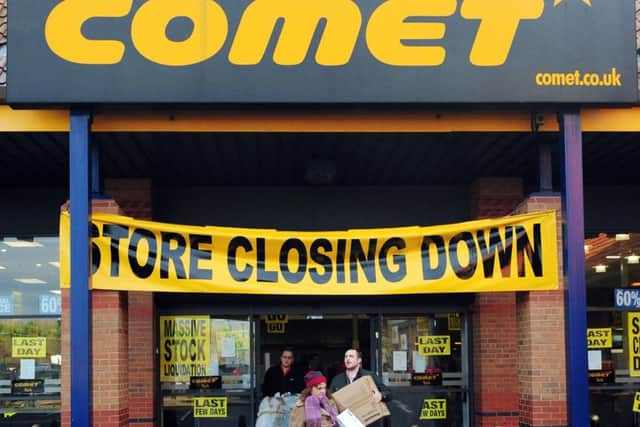No sale and no shops, either: Vanishing face of the high street
By the time the next January rolled around, there would be no sale and no shops, either.
The company, formed in Hull in 1933, had been a trailblazer in its day, filling whole pages of newspapers with price lists of its discounted TV sets, hi-fi systems and white goods.
Advertisement
Hide AdAdvertisement
Hide AdThe internet did away with the need for that, but it wasn’t the only disruptive influence on the high street.


The replacement of traditional shopkeepers by venture capitalists, and the fragmentation of town centres by out-of-town malls also conspired to consign Comet to the list of failed names that once had been famous.
Woolworth, BHS, Austin Reed, MFI, Toys R Us, Borders, Blockbuster, Focus and Tandy are also among the casualties of the biggest shopping shake-up since the end of rationing.
Ironically, Comet had helped to pioneer large stores with car parks, out in the suburbs. Its history was also inextricably linked with that of Woolworth, which acquired it in the 1980s but then spun off into a separate company.
Advertisement
Hide AdAdvertisement
Hide AdUltimately, their problems were separate but similar, according to retail consultant Graham Soult. Neither had stood out from the competition.
“If you look at the retailers that have disappeared, it’s rarely a complete surprise,” he said.
“They’re usually either operating in a sector in decline or they’re businesses that simply aren’t that good.”
Toys R Us, which collapsed last year, was a case in point, he said.
Advertisement
Hide AdAdvertisement
Hide Ad“It certainly isn’t true that people aren’t buying toys in physical shops any more. It’s just that Toys R Us really hadn’t moved on in 20 years. It was soulless.
“The toy retailers who are doing well, like The Entertainer, have a bit more magic and in-store theatre as we like to call it.”
Mr Soult, who runs CannyInsights.com, believes that the high street is far from dead, citing expanding chains like Home Bargains and B&M as the current stars of the sector. B&M bought the Hull retailer Heron Foods in 2017 to expand its grocery range.
“Retail has always evolved, and will keep doing so,” he said.
Advertisement
Hide AdAdvertisement
Hide Ad“A decade on from the Woolworths’ closure, it’s remarkable that nine out of 10 of its shops remain in active retail use, as new occupants arrive to fill the gap.”
But the retreat to online retailing is undeniable, and many in the industry are demanding more structured defences from local and central government to shore up our high streets.
Among them is Bill Grimsey, an analyst and author who predicts that in five years, half of non-food selling will be done online.
Mr Grimsey, himself a battle-scarred veteran of the store wars, having run collapsed the Focus DIY chain, wants to see town centres repopulated as “community hubs” which include arts and office space, as well as shops.
Advertisement
Hide AdAdvertisement
Hide AdHe is also among many calling for an overhaul of business rates, which, he says, are outdated and have accelerated shop closures.
He blames some casualties on venture capitalists who snapped up retailers, selling off their property and stripping assets, and warns that shopping malls, too, are under threat.
“There are only so many pound shops you can put down, and eventually these B-grade parks will become tumbleweed parks,” he said.